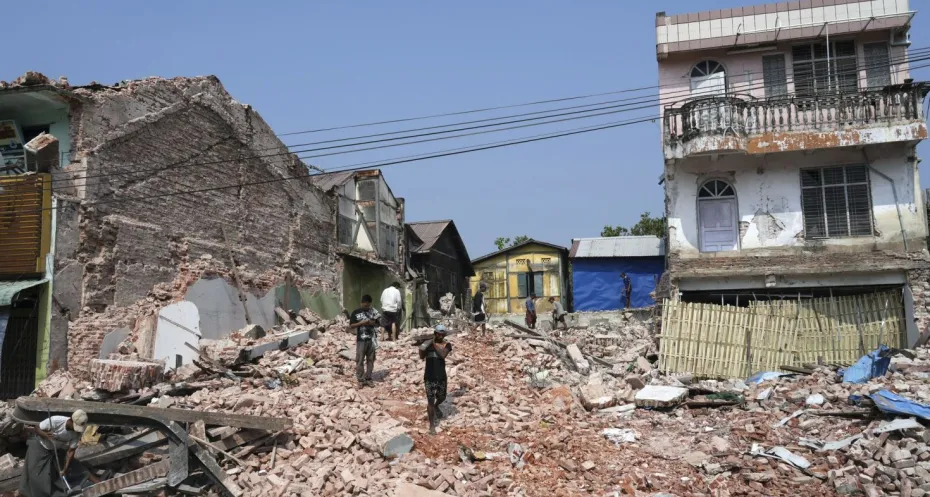Information is key after earthquake in Myanmar

On March 28 this year, Myanmar and parts of Thailand were hit by a devastating earthquake, followed by a series of strong aftershocks. Central Myanmar is an earthquake prone region and over 198,000 people were displaced, living outside whilst fearing for even more aftershocks. In the past few years, there has been ongoing conflict in this region with active fighting between pro-democracy and pro-military groups. The ongoing conflict has incited a major humanitarian crisis in Myanmar, with an estimated 3.5 million internally displaced people across the country and many more in need of humanitarian assistance. Even the same night of the earthquake, aerial bombardment continued. We spoke with Annie Zaman, our safety consultant, regarding the first response after the quake.
Crisis upon crisis
In Mandalay, the second biggest city in Myanmar, the vast majority of people were living outside after the quake. When a storm hit the city shortly after, it became a crisis upon crisis for people. There was no electricity or internet, resulting in a total blockage of information. It even took days for any information to come out of Myanmar, whilst people were already much aware of the situation in Thailand for instance. The military immediately stated that international media were not allowed into the country, people weren’t even allowed to move freely within the country - to safer areas for instance. There are checkpoints everywhere in Myanmar, even preventing relief to reach the affected areas.
Even before the earthquake, having access to information was a challenge. Since the military coup in 2021 there has been a crackdown on independent media and freedom of expression in the country. Alongside China, Myanmar has jailed the highest number of journalists in the world. The military junta keeps a tight grip on the flow of information in the country by centralising information and censoring independent media and journalists. With the escalating violence on journalists many have had to flee the country and work in exile. Those who remain risk their lives every day to report the truth.
First response
Immediately after the earthquake Free Press Unlimited received a surge of requests from journalists and media professionals for support. Within days, FPU was able to set up a small emergency relief fund. Through trusted local networks we distributed small grants, we were also able to supply communication tools and deliver power batteries. One medium sized newsroom received a Starlink kit, for satellite internet, and a few months subscription. Even if you get a regular internet connection in Myanmar, uploading videos is often impossible. Therefore, Starlink is a great solution to get a viable internet connection for journalists and newsrooms. The demand for support was so high that we decided to distribute only small grants, worth €450 or less. This way we can support as many journalists as we can. These funds addressed not only journalistic needs but also urgent humanitarian demands.
“The first requests we received were for body bags and funeral costs. That is how severe the situation is”, says Annie Zaman. “Prioritizing needs in terms of distributing small grants in such a context is extremely challenging and heartbreaking.”
Infrastructure constraints
Sending money into Myanmar remains a logistical and legal challenge. Due to sanctions and surveillance, regular bank transfers are not an option. Free Press Unlimited relies on trusted informal networks to transfer funds discreetly and securely. A core focus for us is to ensure we strengthen these trusted networks, as it is the most efficient, secure and safe way to get funds directly to the people that need it. This earthquake came right after the disabling of USAID, so even when President Trump made the statement to send relief funds to Myanmar - they had no way of actually distributing these funds. The entire USAID infrastructure is disabled, to a point where even three USAID employees got fired whilst working on earthquake relief.
In Myanmar most media houses work underground and journalists work secretly from their homes. With so many houses destroyed, journalists don’t have a safe place to report from currently. It is extremely dangerous to disclose to your surroundings that you work as a journalist, as this is considered a crime. Even for a simple house visit from friends or relatives, people in Myanmar must request official permission from the town warden. Occasionally, journalists get amnesty from prison and are told upon release to report back at their local police station. Some flee the country right away and come to Thailand to work from exile. But others are so traumatized that they actually do it. Resulting in relentless police or military scrutiny again, with regular visits and raids.
The path forward
In the months since the quake, Myanmar’s journalists continue to face enormous challenges, worsened by infrastructure breakdowns and ongoing military repression. However, even when the damages from the earthquake will get restored, people in Myanmar will still be getting blocked from the internet deliberately for the benefit of the military junta. International support remains vital, not only for connectivity and emergency tools but also for legal protection, visibility, and long-term resilience.
“Information is key. If the world doesn’t know how much devastation has happened, how can they send help?”, Annie Zaman.
Free Press Unlimited is committed to press freedom and the safety of journalists worldwide.
